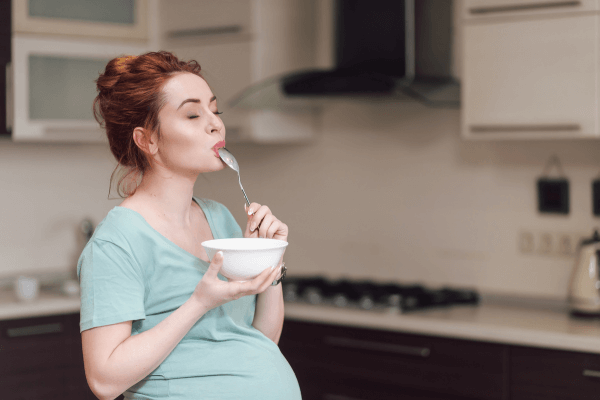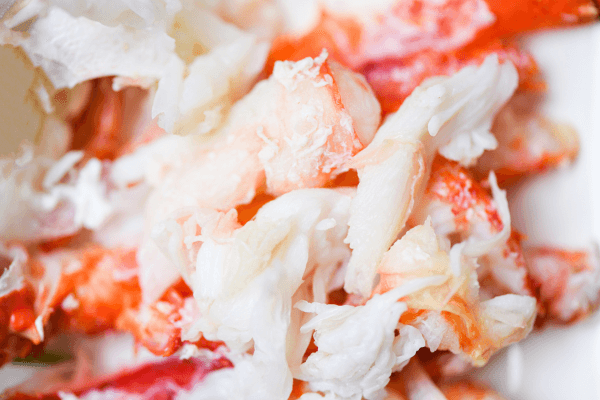Is it Safe for Pregnant Women to Eat Imitation Crab? What You Need to Know

When it comes to the topic of whether it is safe for pregnant women to eat imitation crab, there are several considerations to take into account. Understanding what imitation crab is, the ingredients it contains, and the potential benefits and risks of consuming this seafood alternative is crucial for expectant mothers.
Imitation Crab: An Overview

Crab Stick Sushi – Photo by Declan Sun on Unsplash
Imitation crab, also known as surimi, is a popular seafood substitute made from processed fish, typically pollack, that is flavored and colored to resemble real crab meat. Widely used in dishes like California rolls and crab salads, imitation crab is a convenient and affordable alternative to real crab.
What is Imitation Crab?
Imitation crab is a type of seafood made from a blend of fish proteins, starches, and flavorings to mimic the taste and texture of real crab meat, showcasing how imitation crab is made. It is commonly used in sushi, salads, and various seafood dishes as a cost-effective replacement for fresh crab.
Ingredients in Imitation Crab
The main ingredients in imitation crab include pollack fish, starches, sugar, sorbitol, and artificial flavorings and colorings. While it offers a similar taste to real crab, imitation crab may contain additives and preservatives to enhance its appearance and shelf life.
Benefits and Risks of Consuming Imitation Crab
Consuming imitation crab can provide a source of protein and omega-3 fatty acids, but it may also contain high levels of sodium and other additives. Pregnant women should be cautious when eating imitation crab due to potential risks such as mercury content and the processing methods involved in its production.
Eating Imitation Crab During Pregnancy

When it comes to the safety of consuming imitation crab during pregnancy, there are important factors to consider to ensure the well-being of expectant mothers and their babies. Understanding whether imitation crab is a safe choice, the potential risks it may pose, and alternative options available is crucial for pregnant women.
Is Imitation Crab Safe for Pregnant Women?
Pregnant women should proceed with caution when it comes to eating imitation crab. While it is fully cooked and considered safe to consume for most people, pregnant women are advised to be aware of potential risks such as high sodium levels and additives that could be harmful during pregnancy.
Considerations for Pregnant Women Eating Imitation Crab
When deciding whether to eat imitation crab while pregnant, it’s essential to consider the source of the seafood, the processing methods involved, and any added ingredients. Being informed about the potential mercury content and ensuring that the imitation crab is properly cooked can help reduce risks.
Alternatives to Imitation Crab for Pregnant Women
For pregnant women seeking alternatives to imitation crab, options like fully cooked shrimp, lobster, or real crab can provide similar flavors and nutrients without the additives found in imitation crab. Opting for seafood varieties that are lower in mercury and free from raw fish can be a safer choice during pregnancy.
Nutritional Value of Imitation Crab

Imitation crab, although not as nutritious as real crab, still offers some benefits. Let’s delve into the calorie and nutrient content in imitation crab, understand its health implications, and compare it to real crab.
Calories and Nutrients in Imitation Crab
Imitation crab is relatively low in calories compared to real crab, making it a lighter option. However, it may lack some essential nutrients present in real crab, such as vitamin B12 and zinc. It does provide protein and omega-3 fatty acids, but in lower quantities.
Imitation crab, also known as crab stick or “kani,” is a type of seafood product made from surimi – a fish paste typically made from white fish like pollock. It’s flavored and colored to resemble crab meat. Here’s some nutritional information for a typical serving of imitation crab (approximately 3 ounces or 85 grams):
- Calories: About 80-100
- Protein: Approximately 6-8 grams
- Carbohydrates: Roughly 10-15 grams, mostly from sugars and starches used in processing.
- Fat: Usually less than 1 gram, since it’s a low-fat product.
- Cholesterol: About 10-20 milligrams
- Sodium: High in sodium, often ranging from 300 to 600 milligrams per serving.
- Vitamins and Minerals: Some calcium, potassium, and a small amount of iron may be present.
Health Benefits and Concerns of Consuming Imitation Crab
While imitation crab can be a convenient source of protein, pregnant women should be cautious due to its high sodium and additives content. The processing methods involved may also raise concerns about food safety. It’s crucial to balance the potential benefits with the risks.
How Imitation Crab Compares to Real Crab
Real crab offers a more natural and nutrient-dense option compared to imitation crab. It contains higher levels of essential nutrients and is less processed. When possible, opting for real crab over imitation crab can provide better overall health benefits.
Crab and Seafood Consumption During Pregnancy

Photo by Alicia Petresc on Unsplash
When considering crab and seafood consumption during pregnancy, it’s essential to be mindful of certain guidelines and factors to ensure the well-being of both the mother and the baby. Understanding the potential risks associated with mercury levels in crab and other seafood products is crucial for pregnant women making dietary choices.
General Guidelines for Eating Crab During Pregnancy

Pregnant women should follow certain guidelines when consuming crab, whether it’s real or imitation. Ensuring that the seafood is thoroughly cooked, avoiding raw fish, and opting for low-mercury options can help minimize potential risks and ensure a safe eating experience.
Mercury Levels in Crab and Seafood Products

Mercury levels in crab and seafood can vary, and pregnant women should be cautious of consuming high-mercury seafood during pregnancy. Choosing seafood options that are lower in mercury, such as shrimp or salmon, can be a safer choice for expectant mothers to meet their nutritional needs.
Safe Seafood Choices for Pregnant Women

When it comes to selecting safe seafood choices during pregnancy, it’s advisable for pregnant women to opt for varieties that are low in mercury and free from potential contaminants. Including a variety of seafood in moderation can provide essential nutrients while minimizing exposure to any harmful substances.
- Salmon: Very low (average mercury levels of 0.022 parts per million or ppm)
- Anchovies: Very low (average mercury levels < 0.016 ppm)
- Sardines: Very low (average mercury levels of 0.013 ppm)
- Shrimp: Very low (average mercury levels < 0.001 ppm)
- Pollock: Low (average mercury levels of 0.031 ppm)
- Catfish: Low (average mercury levels of 0.025 ppm)
- Trout (freshwater): Low to moderate (average mercury levels can vary, generally around 0.071 ppm)
- Tilapia: Low (average mercury levels of 0.013 ppm)
- Scallops: Low (average mercury levels < 0.003 ppm)
- Clams: Low (average mercury levels < 0.002 ppm)
- Squid (calamari): Low to moderate (average mercury levels can vary, generally considered to be low)
- Crabs: Low to moderate (average mercury levels vary by species, generally below 0.200 ppm)
- Oysters (cooked): Low to moderate (average mercury levels can vary, generally considered to be low)
- Herring: Moderate (average mercury levels can vary, some sources report average levels around 0.04 ppm)
FAQs
Q: Is it safe to eat imitation crab meat during pregnancy?
A: Yes, it’s safe to eat imitation crab meat during pregnancy as it is made from cooked surimi, a fish paste, and thus does not pose the same risk as consuming raw fish or meat. However, moderation is key, and it’s important to ensure it’s consumed as part of a balanced diet.
Q: Can pregnant women eat crab sushi including California rolls?
A: Pregnant women can eat crab sushi such as California rolls because they typically contain imitation crab, which is cooked. However, any sushi that contains raw fish should be avoided during pregnancy to reduce the risk of listeriosis and other foodborne illnesses.
Q: What are the nutritional benefits of eating imitation crab meat while pregnant?
A: Imitation crab meat can be a good source of some important nutrients for pregnant women, such as low-fat protein and some vitamins and minerals. However, because imitation crab contains additives and lower amounts of omega-3 fatty acids compared to real crab, it should be eaten in moderation and complemented with other nutrient-rich foods.
Q: Are there any risks associated with eating imitation crab meat when you’re pregnant?
A: While generally safe, eating imitation crab meat during pregnancy can pose risks if consumed in excess due to its high sodium content and food additives, which can lead to increased blood pressure and water retention. As always, moderation is key.
Q: Is it safe for pregnant women to eat shrimp and other seafood alongside imitation crab?
A: Yes, pregnant women can eat shrimp and many other types of seafood as they are good sources of protein and omega-3 fatty acids. However, it’s important to eat seafood that is low in mercury and cooked thoroughly to prevent foodborne illness. Shrimp, salmon, and light canned tuna are generally safe choices, but raw seafood should be avoided.
Q: How much imitation crab meat is safe to eat during pregnancy?
A: There isn’t a specific recommendation for the amount of imitation crab meat safe to eat during pregnancy. However, it’s advisable to limit consumption to two to three servings a week, ensuring that your overall diet is varied and balanced to support the health of both mother and baby.
Q: What are some safe alternatives to imitation crab meat for pregnant women craving seafood?
A: For pregnant women craving seafood but looking for safer alternatives to imitation crab, options include cooked salmon, tilapia, and trout, which are low in mercury and provide beneficial omega-3 fatty acids. Always ensure the seafood is cooked thoroughly to avoid the risk of foodborne illness.
Q: Can eating imitation crab meat affect the baby during pregnancy?
A: Eating imitation crab meat in moderation during pregnancy is not likely to directly affect the baby. However, maintaining a balanced diet with adequate nutrients is crucial for fetal development, so while imitation crab can be part of a pregnant woman’s diet, it shouldn’t be a main source of protein.











